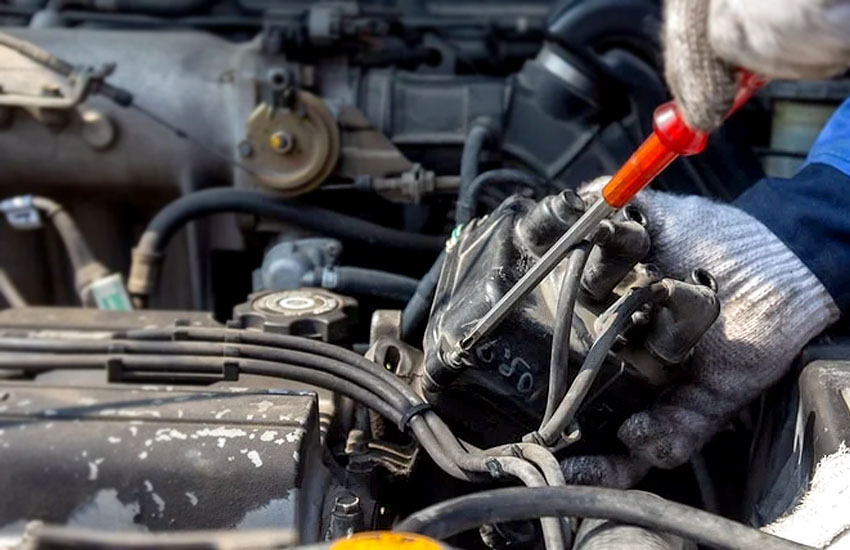As an Amazon Associate, I earn from qualifying purchases at no extra cost to you.
Car Jerks While Driving At Constant Speed: Troubleshooting Tips
Ever found yourself cruising on the highway, enjoying the smooth ride, and suddenly your car jerks? It’s an annoying, sometimes concerning experience that many drivers face at one point or another. If you’ve been wondering why your car jerks while driving at a constant speed, you’re not alone! In this article, we'll break down the causes, how to fix it, and how you can prevent it from happening again. So let's dive right in!

Possible Causes of Jerking at Constant Speed
Have you ever been driving at a steady pace, only to feel the sudden jerk of your car? It's like your car's trying to play a little game of “guess the next move.” This can be a frustrating and even unnerving experience, especially when you don't know what's causing it. But don’t worry; there are several common reasons why cars jerk while driving at a constant speed, and understanding these can help you troubleshoot the issue. Let’s take a closer look at the most common causes.
1. Faulty Fuel System
One of the main culprits behind jerking at a constant speed can be a malfunction in your car’s fuel system. This could be an issue with the fuel injectors, fuel pump, or fuel filter. The fuel injectors are responsible for delivering the right amount of fuel to your engine. If these injectors become clogged or damaged, it can cause inconsistent fuel delivery, resulting in jerking as the engine stutters trying to maintain speed. Similarly, a dirty fuel filter can restrict the flow of fuel to the engine, causing performance issues, including jerking.
2. Issues with the Ignition System
Another common reason for jerking at constant speed is problems with your car's ignition system. The ignition system includes components like the spark plugs, spark plug wires, and ignition coils. If any of these parts are malfunctioning or worn out, they may not ignite the fuel mixture in the engine properly, leading to misfires. When a misfire happens, you may feel a sudden jerk or hesitation while driving, especially at a constant speed when the engine is trying to maintain its pace.
3. Transmission Troubles
Your car's transmission plays a major role in ensuring smooth acceleration and consistent speeds. If there's an issue with the transmission, such as low transmission fluid, worn-out gears, or problems with the transmission control module, it can result in jerking or hesitation when you try to maintain a constant speed. This is especially common in automatic transmissions, where the transmission is responsible for shifting between gears based on speed and load. If the transmission is struggling to make smooth shifts, you might experience jerking.
4. Worn or Faulty Engine Mounts
Engine mounts are the components that secure the engine to the vehicle's frame. Over time, these mounts can wear out or become damaged, causing the engine to move around more than it should. This movement can result in jerking or shaking when you’re driving at a constant speed. If you feel vibrations or jerking sensations that seem related to the engine, it might be time to check your engine mounts.
5. Dirty Air Filter
A clogged or dirty air filter can also cause jerking. The air filter ensures that the engine receives a steady supply of clean air, which is necessary for the fuel-air mixture to combust properly. If the air filter is clogged, it restricts airflow to the engine, leading to an imbalance in the fuel mixture. This can cause the engine to jerk as it struggles to run smoothly. It's a simple fix—replace your air filter—and your car will be breathing easy again!
6. Faulty Mass Air Flow (MAF) Sensor
The Mass Air Flow sensor measures the amount of air entering the engine and sends this data to the car's computer. The computer then adjusts the fuel-to-air ratio to optimize engine performance. If the MAF sensor is faulty or dirty, it may send inaccurate readings, causing the engine to run too rich or too lean. This can lead to jerking, stalling, or hesitation, especially at steady speeds.
7. Vacuum Leaks
Your car's engine relies on a system of vacuum hoses to control various functions, such as the power brakes, emissions control, and engine performance. A vacuum leak can disrupt the flow of air and fuel to the engine, leading to rough idling, stalling, or jerking at steady speeds. The good news is that vacuum leaks can be identified and fixed fairly easily, so if you suspect a leak, it's worth getting checked out.
8. Problems with the Throttle Body
The throttle body is responsible for controlling the amount of air that enters the engine, which in turn affects engine speed. If the throttle body becomes dirty or faulty, it can cause irregular airflow into the engine, leading to jerking or stuttering while driving. A dirty throttle body is a common problem, especially if your car has a lot of miles on it, but it’s something that can be cleaned or replaced relatively easily.
9. Low Tire Pressure
Believe it or not, low tire pressure can sometimes cause jerking while driving. When one or more of your tires is underinflated, it can create an uneven distribution of weight, which can cause the car to jerk or pull to one side. It's always a good idea to check your tire pressure regularly and make sure it's in the recommended range to avoid any jerking issues.
10. Software or Sensor Issues
Modern cars are equipped with all sorts of sensors and computer systems that help regulate engine performance. Sometimes, an issue with one of these sensors, or even a glitch in the car's software, can cause jerking. In such cases, the problem is typically not mechanical but rather a software or electrical issue that requires a professional diagnosis.
How to Diagnose and Fix the Issue
Now that we've covered the common causes of jerking at a constant speed, it's time to figure out how to diagnose the issue. Depending on the root cause, the fix might range from a simple DIY task to something that requires professional intervention. Let's walk through the process.
Step 1: Check the Fuel System
If you suspect the jerking is related to the fuel system, start by checking the fuel filter. A clogged fuel filter can easily disrupt the flow of fuel to the engine. If the fuel filter is clogged, replacing it is a relatively easy and inexpensive fix. Next, inspect the fuel injectors. If they're clogged or damaged, they might need to be cleaned or replaced. This can be done by a mechanic or as a DIY project if you have the right tools.
Step 2: Inspect the Ignition System
A misfire caused by a faulty ignition system can cause jerking. Start by checking the spark plugs. If they're worn out or covered in carbon deposits, they may need to be replaced. The same goes for the spark plug wires and ignition coils. If you're not sure whether the ignition system is the cause, a mechanic can run a diagnostic test to pinpoint the problem.
Step 3: Check the Transmission Fluid
If you suspect the jerking is due to transmission problems, start by checking the transmission fluid level. Low fluid levels can cause slipping or jerking when shifting gears. If the fluid is low or dirty, replacing or topping it off might solve the problem. However, if the issue persists, it could be a sign of a more serious transmission problem that will require professional repair.
Step 4: Inspect Engine Mounts
If you feel jerking accompanied by vibrations, your engine mounts may be the issue. Visually inspect the mounts for any signs of wear or damage. If you notice any cracks or deterioration, it's time to replace the mounts. Engine mount replacement is generally not a DIY job, as it requires lifting the engine to access the mounts.
Step 5: Replace the Air Filter
If you haven't replaced your air filter in a while, this could be the reason for your jerking issues. A dirty air filter can restrict airflow, causing the engine to stutter. Replacing the air filter is an easy and inexpensive fix that you can do yourself. Just make sure you choose the right air filter for your make and model.
Step 6: Clean the Mass Air Flow Sensor
If the MAF sensor is dirty, it can cause the engine to run poorly. Cleaning the MAF sensor with the right cleaning solution can often solve the problem. Be sure to follow the manufacturer’s instructions and handle the sensor carefully to avoid damaging it.
Step 7: Check for Vacuum Leaks
To check for vacuum leaks, visually inspect the vacuum hoses for cracks or wear. You can also use a vacuum leak detector or apply a small amount of brake cleaner or carburetor cleaner to the hoses while the engine is running. If the engine's RPM changes, you've found the leak.
Step 8: Examine the Throttle Body
If the throttle body is dirty, it can affect the air-fuel mixture. You can clean the throttle body yourself with a special throttle body cleaner. Just be sure to follow the manufacturer's recommendations when doing this. If cleaning the throttle body doesn't resolve the issue, it may need to be replaced.
Step 9: Check Tire Pressure
Low tire pressure can cause jerking or uneven driving. Check all four tires and make sure they're inflated to the recommended pressure level. If one tire is low, it's a good idea to check the others as well to ensure consistent handling.
Step 10: Visit a Mechanic for a Diagnosis
If you've gone through all the above steps and the jerking continues, it might be time to take your car to a professional. A mechanic can run a full diagnostic to identify the issue and provide a solution.
Preventing Jerking and Ensuring Smooth Driving
Preventing jerking at a constant speed isn't just about fixing issues when they arise—it's about regular maintenance and taking care of your car to keep it running smoothly. Here are some tips for ensuring a smooth and jerk-free ride:
1. Regular Maintenance
One of the best ways to prevent jerking is by staying on top of your car’s regular maintenance schedule. This includes things like changing the oil, replacing the air filter, checking the spark plugs, and inspecting the brakes. Keeping your car in good working order will ensure that all systems function properly, reducing the chances of jerking or other performance issues.
2. Monitor Fluid Levels
Keeping an eye on fluid levels—especially transmission fluid, engine oil, and coolant—can help prevent jerking caused by fluid-related issues. Regularly check these fluids and top them off when needed. If you notice that your fluids are running low frequently, it could be a sign of a leak that needs to be addressed.
3. Drive Smoothly
Driving habits play a significant role in how your car performs. Try to avoid sudden acceleration or harsh braking, as these actions can strain the engine and transmission, potentially leading to jerking. Smooth and gradual driving will help keep your car in good shape and minimize jerking.
4. Regular Tire Maintenance
Make sure your tires are properly inflated and rotated regularly. Uneven tire wear or low tire pressure can lead to jerking or uneven handling. Keep an eye on your tire pressure and get them rotated as per your car’s recommendations.
5. Address Issues Early
Don't wait for the jerking to get worse before addressing it. If you notice any irregularities in how your car is driving, such as jerking, stuttering, or hesitation, it's best to get it checked out sooner rather than later. Early intervention can save you money and time in the long run.
I hope this article has helped shed light on why your car jerks while driving at a constant speed. Understanding the potential causes and solutions can go a long way in helping you address the problem early and keep your car running smoothly. Remember, regular maintenance and quick action when issues arise are key to preventing jerking and ensuring a smooth driving experience.
Frequently Asked Questions
Is it normal for my car to jerk while driving at a constant speed?
It's not typical for your car to jerk during steady driving. If it happens often, it's best to investigate the cause and have it repaired if needed.
Can a bad fuel filter cause jerking at constant speed?
Yes, a clogged fuel filter can restrict fuel flow and cause jerking or hesitation while driving.
Do I need to replace spark plugs to fix jerking?
If your spark plugs are worn out or dirty, replacing them can help fix jerking caused by ignition system issues.
Is it safe to drive a car that jerks at constant speed?
It's not recommended to continue driving a car that jerks consistently. It may indicate a mechanical issue that could worsen if not addressed.
Can low transmission fluid cause jerking?
Yes, low transmission fluid can cause jerking, slipping, and difficulty shifting gears.
Is it possible for vacuum leaks to cause jerking?
Yes, vacuum leaks can disrupt engine performance and lead to jerking, especially at steady speeds.
Do I need to visit a mechanic if my car jerks while driving?
If the jerking persists despite simple fixes like replacing the air filter or checking the tires, it’s a good idea to have a mechanic diagnose the problem.
Can driving habits affect jerking at constant speed?
Yes, smooth driving habits can prevent unnecessary strain on the engine and transmission, helping to reduce jerking.











